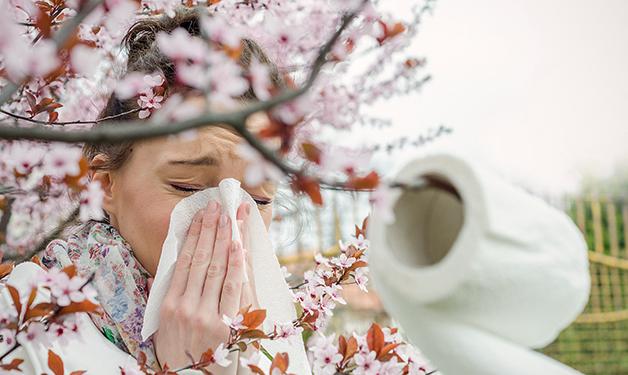
Air quality expert Dr. Karen Bartlett shares advice for managing hay fever.
Colourful flowers and tiny buds may be a welcome sign of spring for some. For hay fever suffers, they warn of pending congestion and blooming allergy symptoms. Our researcher and toxicologist Dr. Karen Bartlett has some sage advice to help you cope this allergy season.
Q: Are my hay fever symptoms from pollen, mold, dust mites or a cold?
A: Often, people experience similar symptoms for colds and hay fever. They are both part of our body’s immune response—our body’s defense mechanism against anything that enters it that appears foreign or harmful. The difference between colds and allergies is that viruses cause colds, while particulate antigens—such as pollen or dust mites—cause allergies. You know you have a cold when your symptoms peak and go away within a week or two. On the other hand, pollen allergies occur seasonally when a particular plant is pollinating and can last much longer.
Q: My doctor prescribed antihistamines for my allergies. Are these going to help me and are there natural alternatives?
A: Apart from allergy medications, the only other effective way to diminish symptoms would be to wear an N95 mask. These masks are available at most pharmacies and help to filter out larger particulate matter that can provoke an allergic response. Nasal saline irrigation—when a warm saline solution is used to flush out nasal passages—can also help relieve the symptoms of congestion.
Q: My hay fever symptoms are bad—itchy eyes, congestion and sneezing. Is there a cure?
A: You can get over-the-counter medications to help treat the symptoms of hay fever. For example, antihistamines treat a variety of nuisance symptoms, including congestion, itchy eyes, sneezing and a runny nose. There are also specialized medications that target only one of those symptoms, such as eye drops to treat itchy eyes and nasal sprays to treat congestion. For people who have more severe symptoms, such asthma or anaphylaxis, the closest thing to a cure is desensitization treatments or allergy shots. This is a procedure a doctor can recommend that involves administering shots with a small amount of the antigen that is causing the allergy symptoms. The idea is that, over time, the patient will build up a tolerance to the allergen and the symptoms will become less severe.
Q: How effective is the allergy shot and when should I consider getting it?
A: Before considering getting an allergy shot, you should see an immunologist and find out what exactly you are allergic to using an allergy test. This involves scratching the skin with different allergens. If an allergic reaction occurs on the skin, then you know you are allergic to that particular allergen. At that point, you can discuss different treatment options with the immunologist or your doctor.
Q: Are there certain foods that I should avoid during allergy season?
A: There is no relationship between eating certain foods and seasonal allergies. However, research shows that allergies often start when we are babies. As such, there may be a connection between when certain foods are introduced and the formation of allergies. More research is needed in this area before we can draw any concrete conclusions and make recommendations.



